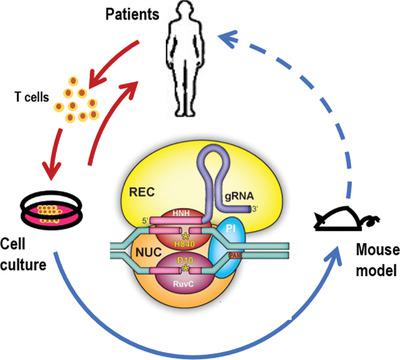Our official English website, www.x-mol.net, welcomes your
feedback! (Note: you will need to create a separate account there.)
Innovative Precision Gene-Editing Tools in Personalized Cancer Medicine.
Advanced Science ( IF 14.3 ) Pub Date : 2020-04-23 , DOI: 10.1002/advs.201902552 Xiaofeng Dai 1 , Pilar Blancafort 2, 3, 4 , Peiyu Wang 5, 6, 7 , Agustin Sgro 2, 3 , Erik W Thompson 5, 6, 7 , Kostya Ken Ostrikov 7, 8
Advanced Science ( IF 14.3 ) Pub Date : 2020-04-23 , DOI: 10.1002/advs.201902552 Xiaofeng Dai 1 , Pilar Blancafort 2, 3, 4 , Peiyu Wang 5, 6, 7 , Agustin Sgro 2, 3 , Erik W Thompson 5, 6, 7 , Kostya Ken Ostrikov 7, 8
Affiliation

|
The development of clustered regularly interspaced short palindromic repeats (CRISPR) has spurred a successive wave of genome‐engineering following zinc finger nucleases and transcription activator‐like effector nucleases, and made gene‐editing a promising strategy in the prevention and treatment of genetic diseases. However, gene‐editing is not widely adopted in clinics due to some technical issues that challenge its safety and efficacy, and the lack of appropriate clinical regulations allowing them to advance toward improved human health without impinging on human ethics. By systematically examining the oncological applications of gene‐editing tools and critical factors challenging their medical translation, genome‐editing has substantial contributions to cancer driver gene discovery, tumor cell epigenome normalization, targeted delivery, cancer animal model establishment, and cancer immunotherapy and prevention in clinics. Gene‐editing tools, epitomized by CRISPR, are predicted to represent a promising strategy toward the precise control of cancer initiation and development. However, some technical problems and ethical concerns are serious issues that need to be appropriately addressed before CRISPR can be incorporated into the next generation of molecular precision medicine. In this light, new technical developments to limit off‐target effects are discussed herein, and the use of gene‐editing approaches for treating otherwise incurable cancers is brought into focus.
中文翻译:

个性化癌症医学中的创新精准基因编辑工具。
成簇规则间隔短回文重复序列(CRISPR)的发展引发了继锌指核酸酶和转录激活子样效应核酸酶之后的连续基因组工程浪潮,并使基因编辑成为预防和治疗遗传疾病的有前景的策略。然而,由于一些技术问题挑战了基因编辑的安全性和有效性,并且缺乏适当的临床法规,使基因编辑能够在不侵犯人类伦理的情况下改善人类健康,因此并未在临床中广泛采用。通过系统地研究基因编辑工具的肿瘤学应用和挑战其医学转化的关键因素,基因组编辑对癌症驱动基因发现、肿瘤细胞表观基因组正常化、靶向递送、癌症动物模型建立以及癌症免疫治疗和预防做出了重大贡献。诊所。以 CRISPR 为代表的基因编辑工具预计将成为精确控制癌症发生和发展的一种有前景的策略。然而,在将 CRISPR 纳入下一代分子精准医学之前,一些技术问题和伦理问题是需要适当解决的严重问题。有鉴于此,本文讨论了限制脱靶效应的新技术发展,并重点关注使用基因编辑方法治疗无法治愈的癌症。
更新日期:2020-06-24
中文翻译:

个性化癌症医学中的创新精准基因编辑工具。
成簇规则间隔短回文重复序列(CRISPR)的发展引发了继锌指核酸酶和转录激活子样效应核酸酶之后的连续基因组工程浪潮,并使基因编辑成为预防和治疗遗传疾病的有前景的策略。然而,由于一些技术问题挑战了基因编辑的安全性和有效性,并且缺乏适当的临床法规,使基因编辑能够在不侵犯人类伦理的情况下改善人类健康,因此并未在临床中广泛采用。通过系统地研究基因编辑工具的肿瘤学应用和挑战其医学转化的关键因素,基因组编辑对癌症驱动基因发现、肿瘤细胞表观基因组正常化、靶向递送、癌症动物模型建立以及癌症免疫治疗和预防做出了重大贡献。诊所。以 CRISPR 为代表的基因编辑工具预计将成为精确控制癌症发生和发展的一种有前景的策略。然而,在将 CRISPR 纳入下一代分子精准医学之前,一些技术问题和伦理问题是需要适当解决的严重问题。有鉴于此,本文讨论了限制脱靶效应的新技术发展,并重点关注使用基因编辑方法治疗无法治愈的癌症。











































 京公网安备 11010802027423号
京公网安备 11010802027423号